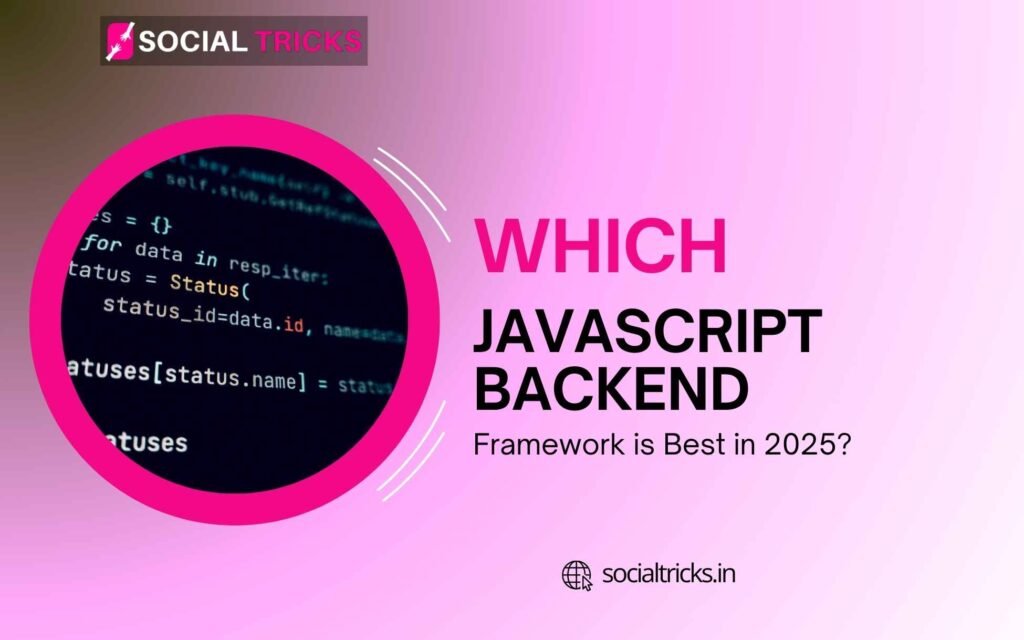Web development is still centered on JavaScript, and its backend frameworks are the key to creating modern and features-rich applications. Growing startups and increasing demand impacting the ease of use for the end-user: it is very imperative for a startup to select the right JavaScript backend framework. This blog goes through doing a study of the best JavaScript backend Frameworks in 2025 to help you select a project using their characteristics.
What is a JavaScript Backend Framework?
A back-end framework is a tool that allows developers to conduct more effective server-side application building with libraries supporting it. Functions such as routing, database management, and authentication may be made easier with the help of these frameworks, and these help start-ups get robust applications quickly and cost-effectively.
Need of a Strong Backend Framework for Startups
Since startups usually lack both time and resources, it becomes necessary to choose the right back-end framework:
Speed of Development: Shortens the coding time with pre-built modules and libraries.
Scalability: Offers a future-proof framework allowing user base growth without hindering application performance.
Cost-Efficiency: Especially since most open-source frameworks are free, it’s cost-effective for budget-strapped startups.
Community Support: Best part comes when you are using a popular framework: you can avail assistance from an active community.
Top JavaScript Backend Frameworks 2025
1. Node.js
Node.js remains a developers favorite for these reasons: its simplicity and performance. It’s a runtime that lets you build server-side applications using JavaScript.
Why Choose Node.js?
Fast and lightweight.
Large ecosystem with NPM (Node Package Manager).
Great for real-time applications like chat apps and gaming platforms.
Features:
Event-driven and non-blocking I/O for fast execution.
Microservices architecture supported.
Best for startups aiming to build Minimum Viable Products (MVPs).
Popular companies are using Node.js:
Netflix
Uber
2. Express.js
Express.js is a minimal and flexible Node.js framework that is perfect for building APIs and web applications.
Why Choose Express.js?
Lightweight and unopinionated.
Flexible routing system.
Seamlessly integrates with middleware.
Features:
Best fit for building RESTful APIs.
Robust error handling.
Compatability with databases like MongoDB and MySQL.
Popular Companies Using Express.js:
IBM
3. NestJS
NestJS is a progressive Node.js framework made with TypeScript. It is meant for those who want to build huge, scalable, and maintainable applications at an enterprise level.
Why Choose NestJS?
Type safety is perfectly assured because of TypeScript support.
Modular architecture makes code reusable.
Best for startups concentrating on complex applications.
Features:
Supports both GraphQL and REST APIs.
Dependency injection for organized code.
Testing utilities are already built in.
Popular Companies using NestJS:
Adidas
Decathlon
4. Fastify
Fastify is really fast, thanks to a low reaction time. It is an alternative to the better Express.js.
Why Choose Fastify?
Twenty to thirty percent faster than Express.js.
Validation based on schema for a solid application architecture.
Slim and straightforward for the developer.
Features:
Optimized for speed.
Plug-ins already built-in to interface with databases.
Ideal for start-ups with vast amounts of data.
Popular Companies Using Fastify:
Microsoft
NearForm
5. Koa.js
Koa.js, made by the authors of Express.js, is a new-age, very lean, minimalistic kind of framework for backend development.
Why Choose Koa.js?
This is smaller and more expressive.
Better control and chain middleware through it.
Startups that need a cutom solution ideal.
Features:
It gives built-in ES6 generators.
Lightweight core.
Perfect for building APIs and web services.
Key Factors to Consider When Choosing a Framework
The following are some of the things every startup should think about when picking a JavaScript framework for the backend:
Ease in Learning: Express.js is easy for starters.
Scalable: Good in scalability are Node.js and NestJS.
Performance: Fastify is the fastest and efficient.
Community Support: It has better facilities for community support in popular frameworks.
TypeScript Support: For this, NestJS suits.
Statistics: Why JavaScript Backend Frameworks are Essential in 2025
Popularity of JavaScript: From the Stack Overflow Developer Survey 2024, 69% prefer JavaScript for web development.
Choice of Startups: For rapid backend development, startups swear by JavaScript frameworks, with over 75% opting for them.
Performance Statistics: Applications made through Fastify boast 50% less response time compared to the most traditional frameworks.
The Best Framework for the Startups in 2025
For startups, the best framework will depend on their particular needs:
For Rapid Development: Express.js
For Type Safety and Enterprise Applications: NestJS
For High Performance: Fastify
For Real-Time Applications: Node.js
For Minimalistic Solutions: Koa.js
Conclusion
The selection of a backend framework in JavaScript can break or shape the face of their application within any startup in 2025. Despite the leaders in the market being Node.js, Express.js, or NestJS for that matter, the market has come up with still more for giving flexibility, performance, and scalability. Know your needs well and select the right framework aligned with all your objectives and business dreams to make you successful soonest possible.


